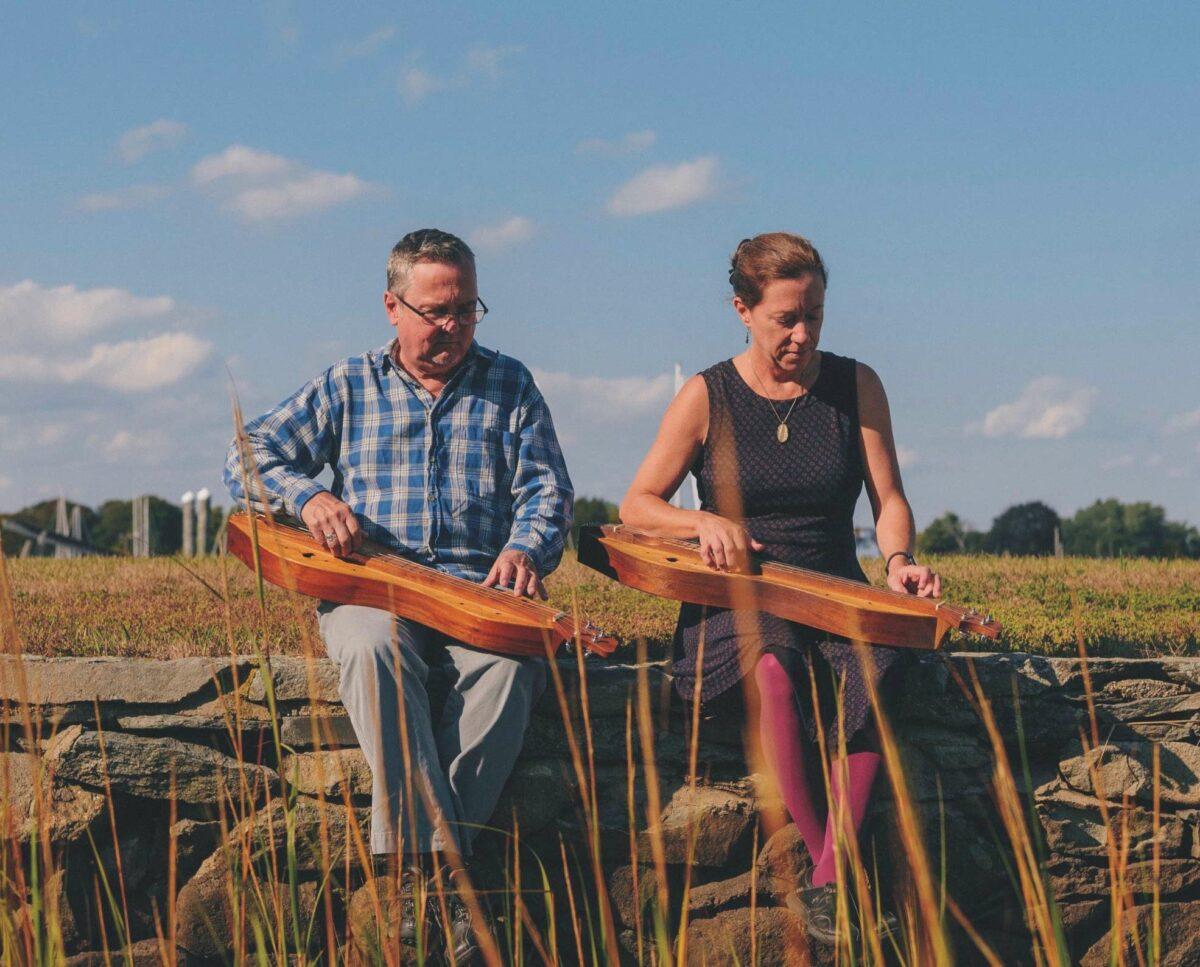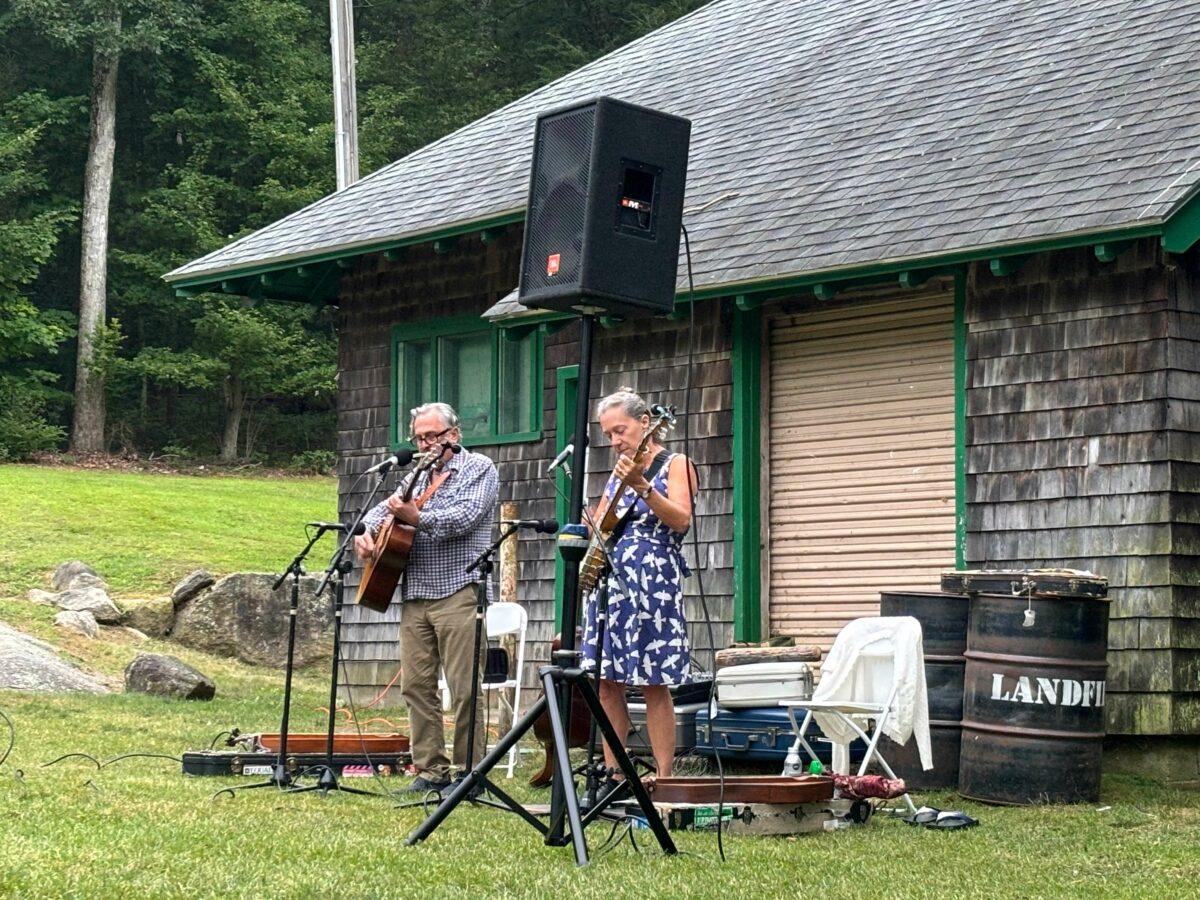
“Tens and Tens of Miles”: Atwater-Donnelly – Hope Pond, Scituate, RI – July 24, 2024
The first show I probably ever went to was the folk duo Atwater-Donnelly, who were based out of my hometown of Scituate, Rhode Island from 1989 to 1997. I would’ve been a baby. I don’t believe I ever saw them live again until last month when I visited my family. Atwater-Donnelly, a husband-wife duo of Aubrey Atwater and Elwood Donnelly, always make it a point to play an annual show in the Scituate village of Hope. This year they played at Hope Pond, a beloved recreational area that is known for its local swimming and excessive goose droppings in the grass.
On this trip home to RI, I sorted through my childhood things, holding on to items tinged with memories and saying farewell to others that were ready for a new chapter with someone else. Something about this experience combined with hearing those who were once the first live musicians I ever encountered was a powerful moment, and got me thinking about the importance of local music, about supporting the art coming out of your immediate community. My hometown has a population of a little over 10,000 people, but seeing Atwater-Donnelly live and witnessing the lineage of folk history that emerged from such a small place reminded me that there are local music scenes everywhere, and they are the lifeblood of the arts. They are the ones that keep the soul in what is too often a soulless industry.

Atwater-Donnelly began in 1987, when Atwater and Donnelly met at the Stone Soup Coffeehouse in Providence, Rhode Island. The coffeehouse, which still hosts events to this day, is one in a longstanding tradition of coffeehouses as hubs for folk musicians to perform and form community. The pair established their folk duo within a few months, and fell in love right in step. As Atwater said at the show, their first date was playing a gig together. They have since released fourteen albums, taught workshops, written songbooks, Atwater has self-published poetry and Donnelly, a cookbook. Their records and live performances draw upon folk music from Appalachia, New England, the Ozarks, England, Ireland, and Prince Edward Island.
Arriving at Hope Pond requires a sharp right turn down a tiny dirt road that feels incorrect, like you’re going into someone’s driveway. Tucked away down the hill, the pond emerges up ahead out of the trees. It had been rainy the week I was home, and the towering trees smelt fresh, verdant, and damp. While I walked from the parking lot down to the field by the pond where Atwater-Donnelly set up, I could already hear them playing, Donnelly strumming lazily on his guitar while Atwater warmed up her tin whistles. The meandering sounds snaked their way through the open area, drifting up from the pond like organic outgrowths of the ground.
The show never truly felt like it “began,” their jamming gently transforming into performance. The only true marker was when Atwater told Donnelly she’d soundcheck a song, and that would just be the first song of the set. Straight ahead, stripped back, Atwater started with an acoustic song as Donnelly wandered out into the field to soundcheck. I reveled in how relaxed and down-to-earth the atmosphere was, like we were eavesdropping on a conversation between two musicians meant just for them. But it also wasn’t like we weren’t there. Throughout the set, Atwater in particular had a natural rapport with us, a way of connecting as if the duo were playing for a circle of friends.

Atwater also delivered this endearing, slyly self-deprecating style of humor that is inherent in Rhode Islanders. My favorite offhand comment of hers was that they’d recently been traveling “tens and tens of miles touring Rhode Island,” a charming dig at the state’s diminutive size. Atwater-Donnelly are also incredibly DIY and still centered on physical releases, with an honor-system suitcase of merch perched off to the side of their performance area filled with CDs and books. Atwater had a fantastic crack about the current state of physical media as well, declaring that you’d get a free used car with every CD purchase so that you could have something to play it on. Each of these jokes displayed a loving self-awareness of the world they inhabited: intimate and DIY folk spaces that still hold onto the “old” ways of circulating music and creating community.
Their performing was just as down-to-earth as their demeanor, playing mostly traditional folksongs they received from primary folk sources or from local folksong archivists, such as their rendition of the ballad, “The Single Sailor.” Atwater-Donnelly also discussed their relationship with the late folksong performer and archivist, Jean Ritchie, whom they knew in the last twenty-three years of Ritchie’s life. They visited her in eastern Kentucky and learned countless folksongs from her. Of course, her influence could most be heard in their dulcimer playing, which was put on display in their performance of the popular “The Wagoner’s Lad,” and another piece which featured both Atwater and Donnelly playing dulcimer parts that wove in and out of one another.
Both musicians were also incredibly versatile, having brought all of their instruments, but unsure whether they’d play them all because of the chance of rain. Fortunately for us, we watched them switch effortlessly among guitar, dulcimer, banjo, harmonica, tin whistle, and mandolin, bringing the different colors of these instruments in and out of the fore. With this delightfully dizzying array of instruments, they played Irish, Scottish, and Appalachian folksongs, including a couple popularized by The Carter Family and Bill Monroe. Along with their clear influence from Jean Ritchie, I heard a lot of inspiration and affinity with the sound of the British folk revival from the mid-twentieth century, bringing to mind Bert Jansch, Pentangle, and Anne Briggs.
For the finale, the pair performed the old-time classic, “Cluck Old Hen,” with Donnelly on guitar and Atwater on banjo and clogging. My mind boggled at how Atwater ripped through this tune on banjo while her feet shuffled and scuffed with absolute precision, her shoes serving as the percussive drive of the song. She kept egging on Donnelly to pick up the tempo, her fingers and feet flying by the end at unimaginable speed. I’d truly never seen anything like it. “Cluck Old Hen,” like all the previous songs in the set, showed how this music is in Atwater-Donnelly’s bones.
After the show, I bee-lined to their suitcase of merch, grabbing a couple of their CDs and Atwater’s songbook from 2001 that transcribes tons of folk tunes for guitar, and most notably, dulcimer. I’ve been thinking about purchasing a dulcimer recently and learning to play, and Atwater kindly encouraged me to email her any questions about buying a dulcimer. The pair were sweet-natured, with what felt like an innate ability to foster folk community.
At one point during the performance, a group of Canadian geese swept across Hope Pond behind us, letting out their collective calls and intertwining their music with Atwater-Donnelly’s. I looked behind me and caught the geese skimming the water’s surface, the mist from the rainy week cloaking them as they disappeared around the bend. I turned back and caught Atwater eyeing them as she sang, a soft grin spread across her face. As the scent of the damp trees came over me again, I inhaled, took it all in. Calling it a homecoming feels too trite, and too resolute. I think the feeling of returning home comes in waves, and isn’t necessarily tied to place. It can be coming back to the musicians who, in a way, put music in my ears, with the songs of generations before me and them.
– Hannah Blanchette
August 29, 2024 | Blog